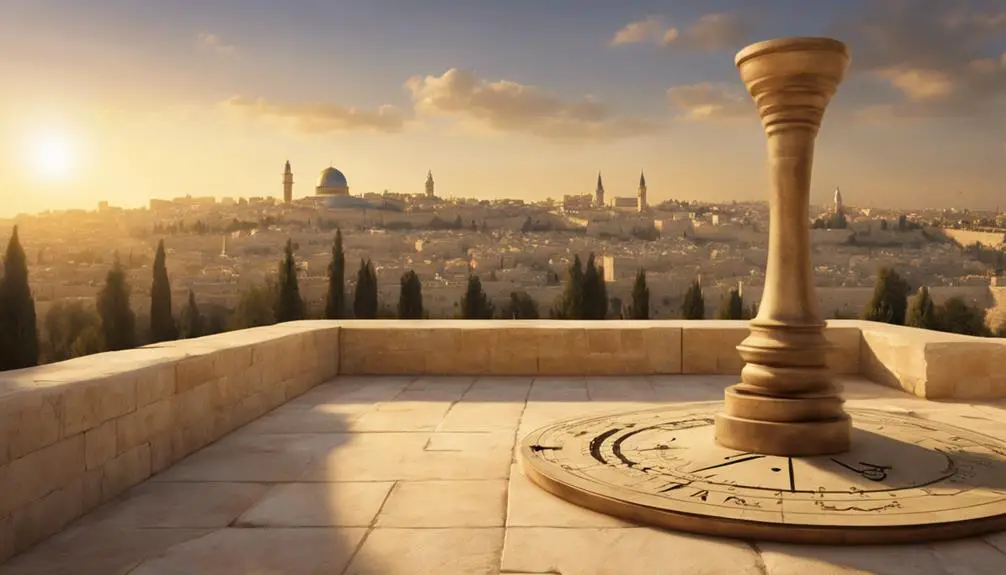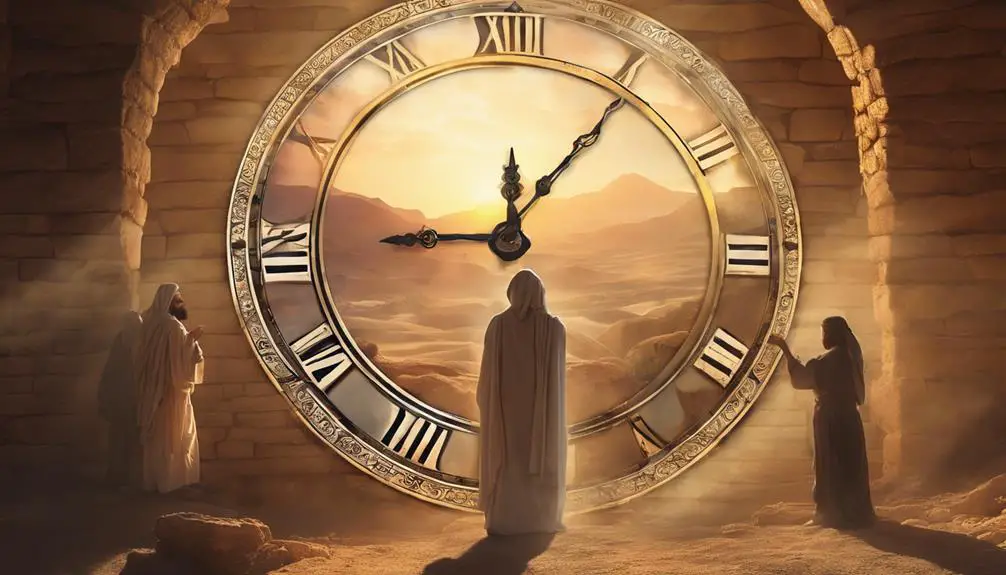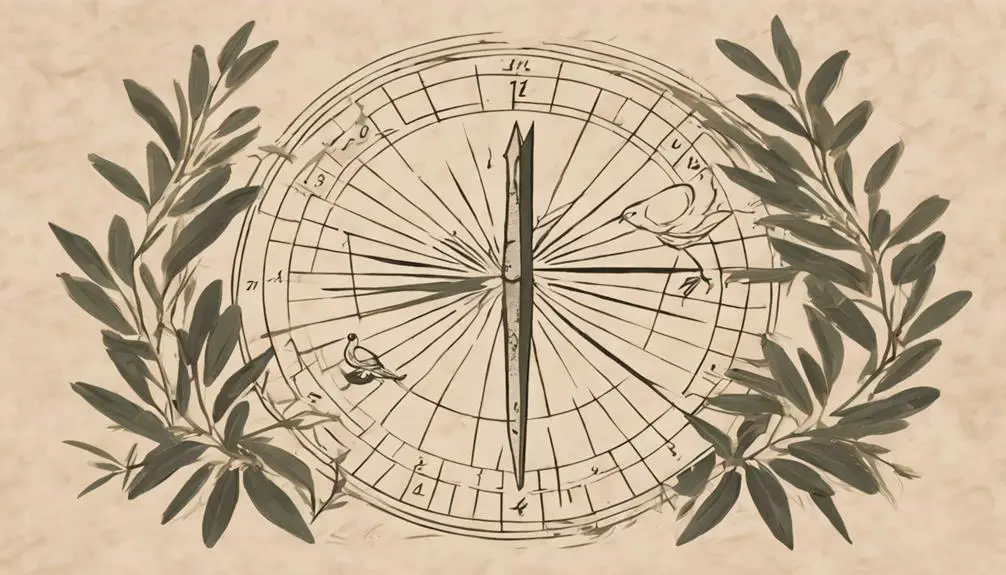Find out why the ninth hour in the Bible is a pivotal moment of divine intervention, shaping faith and mysteries yet to be uncovered.

What Is the Ninth Hour in the Bible
As the clock strikes the ninth hour in the biblical world, you're stepping into a time steeped in mystery and miracles. This isn't just any hour; it's a moment marked by divine intervention and profound spiritual significance.
You'll find that the ninth hour holds a key to understanding not only historical events but also the power of prayer and its symbolic resonance throughout the scriptures. Just when you think you've grasped its importance, you'll discover there's more beneath the surface, inviting you to explore how this pivotal time influences faith and interpretation across generations.
Why does this specific hour hold such weight, and what can it reveal about the broader narrative woven through the Bible?
Key Takeaways
- The Ninth Hour in the Bible corresponds to around 3 PM, marking significant spiritual and historical moments.
- It is associated with miracles, symbolizing divine intervention and moments of transformation in biblical narratives.
- This time was traditionally seen as a powerful moment for prayer, rooted in Jewish customs and reflective of a collective call to worship.
- Symbolically, the Ninth Hour represents a period of transition, fulfilling prophecies and anticipating major shifts in divine plans.
Defining the Ninth Hour

In biblical terms, the ninth hour refers to a specific time of day that holds significant theological and narrative importance within the scriptures. Understanding this concept requires a grasp of ancient time calculation and day division practices. Unlike the modern 24-hour division, the biblical day was divided into 12 hours of daylight and 12 hours of nighttime, starting at sunrise and sunset respectively.
The ninth hour, therefore, falls around 3 p.m. in contemporary terms, marking a critical juncture in the day's progression. This time wasn't chosen arbitrarily; it's deeply intertwined with the practices and beliefs of the period. Analyzing its mention across various biblical passages provides insight into its symbolic and actual significance.
This hour is often associated with pivotal moments in biblical narratives, underscoring its importance beyond mere timekeeping. It's not just a marker of the day's phase but a symbol loaded with theological meaning. To fully appreciate its role, one must delve into the intricacies of time calculation and day division as understood by the ancient peoples. This foundational knowledge illuminates the depth and nuance of the ninth hour's significance in the scriptures.
Historical Context
To fully grasp the ninth hour's significance, it's essential to explore its historical context within the ancient world's societal and religious frameworks. This period, deeply intertwined with Roman timekeeping methods, sheds light on how communities structured their days and their lives around such pivotal moments.
Understanding the ninth hour requires delving into:
- Roman Timekeeping: The Romans divided daylight into 12 hours, meaning the ninth hour varied across seasons. It generally corresponded to our 3 PM, a crucial part of the day for both practical daily activities and significant events.
- Societal Structure: In Roman and surrounding societies, the day's division influenced work, prayer, and social activities. The ninth hour emerged as a natural breakpoint, a time when the bustling noise of day-to-day life began to quiet down, inviting moments of reflection or community gatherings.
- Cultural Practices: This hour held religious significance across different cultures. It was often chosen for prayer or sacrifices, reflecting a collective acknowledgment of the day's transition towards evening. These practices indicate a shared belief in the importance of marking specific times for spiritual purposes.
Ninth Hour Miracles

Having explored the historical and cultural backdrop of the ninth hour, let's now examine the notable miracles attributed to this specific time in biblical narratives. The ninth hour holds profound miracle significance, marking moments of divine intervention and profound transformation. In the context of healing accounts, this time period isn't just a detail but a symbol of divine timing and intervention.
One can't help but ponder the deeper implications of these miracles occurring at the ninth hour. It suggests a deliberate choice by the divine to act at a time of significant religious and cultural importance. This timing underscores the miracles' impact, highlighting them as signs of divine presence and power. The healing accounts, therefore, serve not only as testimonies of physical restoration but also as metaphors for spiritual renewal and the breaking in of the divine into the human realm.
Analyzing these ninth hour miracles, it becomes evident that they're carefully positioned within the biblical narrative to teach, inspire, and challenge. They aren't merely accounts of supernatural intervention but are imbued with layers of meaning, inviting a deeper exploration of faith, timing, and the nature of divine action.
Prayer and the Ninth Hour
The ninth hour emerges as a pivotal moment for prayer in biblical texts, embodying a profound intersection of human supplication and divine response. This time, traditionally understood as approximately 3 PM, holds a rich tapestry of spiritual practices and divine encounters, marking a sacred juncture in the rhythm of the day.
When you delve deeper into the significance of the ninth hour for prayer, you encounter:
- An Established Tradition: The practice of praying at this hour is rooted in Jewish customs, signifying a continuation and deepening of spiritual disciplines.
- A Moment of Divine Favor: Scriptural narratives suggest that prayers offered during this time are particularly potent, opening avenues for heightened divine encounters.
- A Call to Communal Prayer: Beyond individual supplication, this hour often serves as a call for collective prayer, strengthening community bonds through shared spiritual practices.
This convergence of time and divinity underscores the ninth hour as not merely a chronological marker but as a sacred space for engaging with the divine. It invites you to partake in a legacy of prayer that transcends mere human scheduling, embedding your spiritual practices within a broader, divine framework.
Symbolism and Interpretation

Delving into the symbolism and interpretation of the ninth hour, you'll uncover layers of meaning that extend beyond its immediate context to reveal profound theological insights. This moment in biblical narrative isn't merely a point in time; it's a rich tapestry woven with cultural impact and eschatological significance.
Aspect |
Interpretation |
Significance |
|---|---|---|
Time of Day |
The ninth hour marks a transitional period, symbolizing shifts in divine plans and the fulfillment of prophecies. |
Indicates pivotal moments in biblical history and theology. |
Cultural Impact |
It underscores the deep intertwining of religious practices with daily life in ancient times, reflecting the sanctity of specific moments. |
Highlights how sacred times shaped societal norms and personal piety. |
Eschatological Significance |
Embodies the anticipation of end times, serving as a metaphor for the final judgment and the fulfillment of God's kingdom on earth. |
Offers a lens through which to view the ultimate redemption and renewal of creation. |
Your understanding of the ninth hour as merely a time marker will evolve, recognizing its role in illustrating broader themes of transformation, divine intervention, and the hope of eschatological fulfillment.
Frequently Asked Questions
How Has the Concept of the Ninth Hour Influenced Modern Christian Rituals and Practices?
The concept of the Ninth Hour has significantly influenced modern Christian rituals, particularly through fasting and afternoon prayer rituals.
You'll find that the tradition of fasting until the ninth hour (about 3 p.m.) echoes the practice of early Christians, fostering a deep spiritual discipline.
Meanwhile, afternoon prayer rituals, often timed around the ninth hour, serve to remind you of Christ's sacrifice, embedding a moment of reflection and connection in your daily routine.
Are There Any Specific Denominations That Place a Greater Emphasis on the Ninth Hour, and How Do They Incorporate It Into Their Worship?
Yes, certain denominations emphasize the Ninth Hour, especially those with liturgical traditions. They integrate Ninth Hour prayers into their worship, reflecting its historical significance. This moment, traditionally marking Jesus' death, prompts contemplation and prayer.
You'll find it notably in Eastern Orthodox and some Catholic practices, where it's a fixed part of daily prayer cycles. By doing so, they maintain a deep connection to historical events, enriching their spiritual experience.
In Contemporary Times, How Do Theologians and Biblical Scholars Reconcile Discrepancies in Timekeeping Methods When Discussing the Ninth Hour?
Navigating the maze of ancient timekeeping and its modern adaptation, you're diving into an ocean of historical and astronomical precision.
Scholars and theologians use a magnifying glass on the past, blending the ancient with the contemporary. They meticulously reconcile discrepancies through a cocktail of historical context, scriptural interpretation, and astronomical data.
This method isn't just stitching time across millennia; it's a delicate dance of interpretation, ensuring that the ninth hour maintains its sacred echo through time.
Has the Ninth Hour Been Represented or Alluded to in Major Works of Art, Literature, or Music Throughout History?
Certainly, the ninth hour has been a rich source of artistic symbolism and cultural interpretations across history. You'll find it woven into the fabric of major art, literature, and music pieces, reflecting its profound significance.
This imagery often embodies deep theological insights, serving as a bridge between ancient beliefs and contemporary understanding. Through these works, artists and writers have explored and expanded the narrative, offering a multi-layered interpretation of this pivotal moment.
What Are Some Personal Reflections or Testimonies From Individuals Who Have Experienced Spiritual Insights or Revelations During the Ninth Hour?
As a beacon in the twilight, personal stories of the ninth hour prayers illuminate profound personal transformations.
These narratives often delve into how a specific moment of prayer, aligning with the biblical ninth hour, has catalyzed a deep, introspective journey, leading to significant spiritual revelations.
Analyzing these accounts, one discovers a rich tapestry of faith and introspection, showcasing the profound impact of this sacred time on individual lives and spiritual paths.
Conclusion
In conclusion, you've journeyed through the biblical landscape, uncovering the significance of the ninth hour—a moment steeped in divine intervention and profound symbolism. Like the disciples at Pentecost, you've witnessed miracles and the power of prayer at this pivotal hour.
Through scholarly lenses, you've unraveled its deeper meanings, recognizing it as more than a mere timestamp but a bridge connecting the mortal with the divine. This exploration not only enriches your understanding but also invites you to reflect on time's sacred dimensions in your own life.



Sign up